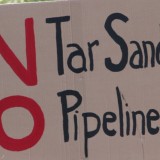This is the third part of a three part series from Rafe Mair on civil dissent.
In the last article I discounted the possibility that any hearing into the Enbridge pipelines or tanker traffic, to and out of Kitimat and Vancouver would dare stop these projects. I considered and rejected, without saying so, any intervention by the federal procedures, specifically the National Energy Board’s Federal Panel Review which held against the Taseko proposal at Fish Lake. I don’t believe for one moment that this Panel would put an end to the pipelines permanently but at most would attach conditions. Since there are no environmental conditions that would prevent horrendous and permanent damage to our environment, the NEB, will, at most, be a slowing down process.
Assuming that the pipelines and tankers are supported by both the federal and provincial governments I don’t believe that any review panel would have the jam to reject the projects outright (nor can it, in fact – it only has the power to make recommendations to the Minister of Environment, who has the final say) but most surely would use the weasel word “mitigation”, where no mitigation is possible or acceptable.
A far better bet is that the Federal cabinet will, as it did with the original Kemano II project, waive the requirement for such a hearing or any other.
Consider the Harper government’s position – to reject the pipelines and tankers would be to reject the Tar Sands, especially if the US Keystone XL pipeline is rejected by President Obama. Even if it is passed by Obama, the heat from China, the projects themselves, plus the pressure of the business community that finances the Tory government will be too strong for Harper & Co. to resist. In fact the approval of environmental destruction comes naturally to right wing governments so that, in my view, the issue moot. When it comes to fighting these projects, the public of BC will be on its own.
What about majority rules? Isn’t that the end of the matter? Both senior governments have mandates so they can do as they please?
This simply is not so. Neither government has faced this as an issue and there have been no referenda. There will not, in my opinion, be any meaningful forum for popular opinion. But the critical question is this: the proposals will do permanent and egregious harm – what government ever has the moral or even legal right to make such a decision without direct citizen approval?
Friends – we must face the fact that neither government will stand in the way of these projects.
I must be careful with my next point. First Nations have, thus far, made it clear to Enbridge that they will not accept the projects. They have recently refused a bribe of 10% of the action. Careful though I must be, it must be recorded that some First Nations have accepted financial inducements to permit fish farms, although most First Nation have opposed; more tellingly, perhaps, some have been induced to supported Independent Power Producers (IPPs) ravishing their rivers. Indeed, in the Klina Klini project, First Nations have sued the provincial government for nixing the project.
One must ask, then, is First Nations rejection of the Pipelines an outright refusal or just part of a negotiation process?
We must prepare for the worst. We must assume that the projects will be approved and, govern our actions accordingly. Clearly, then, we must be ready for civil disobedience.
This, in my view, means three things:
- There must be an obvious flouting of the public will. In the absence of a public referendum on the matter, the flouting of public will becomes clear.
- We must understand that civil disobedience carries with it penalties. Even though these penalties will involve the governments and corporations subverting justice by proceeding criminally in a civil matter, we must realize that this is a penalty we will pay and be prepared to pay it.
- The Civil Disobedience must be on a large scale. We must have leadership and we must provide that leadership with our support and enough money to stand behind those who are fined, go to jail, or both. People’s savings will be attacked and their families will suffer. We can expect no mercy from companies or our very own governments.
The notion of lawbreaking does not come easily to me, a lawyer. The fact remains that the great United States Supreme Court Justice Oliver Wendell Holmes was right when he said that the courts decide the law, not justice.
The cause of preserving our province is too important for us to meekly accept a judge’s finding that prevention of that cause is to be supported by jail sentences. As Justice Holmes so tartly observed, law and justice are not synonymous.
Our question is simple to state: is it justice when any tribunal, parliament, legislature or court destroys our environment, not as a vital need of society but for private profit?



